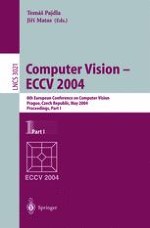2004 | OriginalPaper | Buchkapitel
A Boosted Particle Filter: Multitarget Detection and Tracking
verfasst von : Kenji Okuma, Ali Taleghani, Nando de Freitas, James J. Little, David G. Lowe
Erschienen in: Computer Vision - ECCV 2004
Verlag: Springer Berlin Heidelberg
Enthalten in: Professional Book Archive
Aktivieren Sie unsere intelligente Suche, um passende Fachinhalte oder Patente zu finden.
Wählen Sie Textabschnitte aus um mit Künstlicher Intelligenz passenden Patente zu finden. powered by
Markieren Sie Textabschnitte, um KI-gestützt weitere passende Inhalte zu finden. powered by
The problem of tracking a varying number of non-rigid objects has two major difficulties. First, the observation models and target distributions can be highly non-linear and non-Gaussian. Second, the presence of a large, varying number of objects creates complex interactions with overlap and ambiguities. To surmount these difficulties, we introduce a vision system that is capable of learning, detecting and tracking the objects of interest. The system is demonstrated in the context of tracking hockey players using video sequences. Our approach combines the strengths of two successful algorithms: mixture particle filters and Adaboost. The mixture particle filter [17] is ideally suited to multi-target tracking as it assigns a mixture component to each player. The crucial design issues in mixture particle filters are the choice of the proposal distribution and the treatment of objects leaving and entering the scene. Here, we construct the proposal distribution using a mixture model that incorporates information from the dynamic models of each player and the detection hypotheses generated by Adaboost. The learned Adaboost proposal distribution allows us to quickly detect players entering the scene, while the filtering process enables us to keep track of the individual players. The result of interleaving Adaboost with mixture particle filters is a simple, yet powerful and fully automatic multiple object tracking system.
